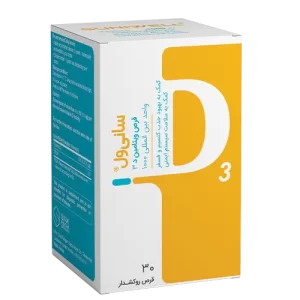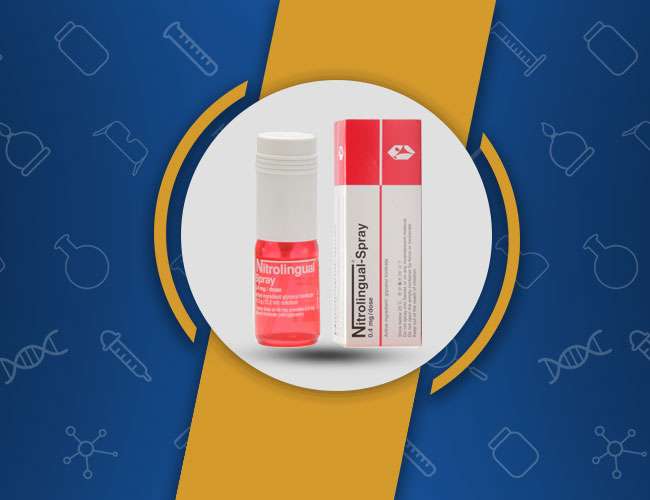
Vitamin D3 -1000 iu

What is Nitrolingual Spray?
Nitrolingual spray is a sublingual spray, which means you have to spray it under your tongue. Its active ingredient in medicine is called nitroglycerin. This dilates the muscles around the blood vessels, making it easier for the heart to do its job. Its active ingredient is nitroglycerin. One dose of sublingual spray contains 0.4 mg of nitroglycerin.
What is Nitrolingual Spray used for?
Nitrolingual spray is used to stop the attack of chest pain (stop angina attacks). You can use it immediately before doing anything you think will cause angina pain in you. You can also use Nitrolingual spray in the following cases:
You have an acute heart attack.
You have acute failure in the left ventricle of the heart. In the hospital, coronary arteries through a catheter (coronary angiography) are often used to treat coronary spasm (clogging of the arteries feeding the heart) during X-rays.
What you need to know before using Nitrolingual spray
Do not use Nitrolingual spray in the following cases:
Allergy (hypersensitivity) to glyceryl trinitrate, other nitrates or any of the other ingredients of this medicine (list of ingredients in the product leaflet in section 6).
Severe hypotension (when your maximum blood pressure (systolic pressure) is below 90 mm Hg.)
Acute circulatory failure (shock, circulatory failure, hypovolemic shock)
Obstructive cardiomyopathy (a disease of the heart muscle that blocks blood flow).
Acute heart problems (cardiogenic shock), except when there is insufficient maintenance pressure in the left ventricle of your heart (left ventricle)
High pressure in the brain (such as head trauma, cerebral hemorrhage)
Severe decrease in red blood cells (anemia)
Taking certain medications (phosphodiesterase inhibitors such as sildenafil, vardenafil, or similar products) to treat impotence (sexual dysfunction) or pulmonary hypertension. If you use these products and spray Nitrolingual, severe or dangerous hypotension may occur.
Always use Nitrolingual spray exactly as your doctor advised. Ask your doctor or pharmacist if you are unsure about how to use it. The spray is for sublingual use and should not be inhaled. Please sit down whenever possible while using Nitrolingual spray. The recommended dose is: The usual dose is 1-2 puffs (0.4-0.8 mg nitroglycerin) sublingually. Never use 3 puffs at a time. The spray should act quickly. If your problem persists, you can repeat your usual dose 10 minutes later. If your symptoms do not go away after the second dose, call your doctor right away.
For more information, download the brochure on the page.
If you have any of the following, talk to your doctor or pharmacist before using Nitrolingual Spray.
Pericardial sac disorders such as contractile pericarditis (inflammation and swelling of the lining around the heart) or cardiac tamponade (compression of the heart due to the accumulation of blood or fluid in the space between the heart muscle and the outer lining of the heart-heart waterfall)
Low heart filling pressure (in cases such as acute heart attack or left ventricular failure). Be careful that systolic blood pressure does not fall below 90 mm Hg.
Severe stenosis of the aorta or heart valves
Circulatory problems, especially if you have a drop in blood pressure when you stand up
Cerebrovascular diseases (brain disorder associated with nourishing blood vessels of the brain)
Moderate to severe stenosis of the heart valves (aortic valve stenosis)
Early stages of an eye disease called glaucoma (in which the pressure inside the eye increases).
Thickening of the left ventricle (left ventricular hypertrophy) with aortic stenosis (aortic stenosis) because nitrilingual spray can theoretically disrupt the blood supply to patients by increasing heart rate (tachycardia) and reducing aortic diastolic pressure.
side effects
Download and read the brochure on the page.
Consumption during fertility, pregnancy and lactation:
If you are pregnant or breastfeeding, suspect that you may be pregnant or planning to have a baby, consult your doctor before taking the medicine. It is not yet known whether nitrous oxide spray or its metabolites are excreted in milk. The possibility that the drug may pose a risk to infants has not yet been ruled out. There is no evidence that this drug has a negative effect on fertility.
Driving and Working with Machines
You should wait at least 5 minutes after using the spray and before driving or using the machines. If you feel tired, dizzy or unwell until you feel better at the start of treatment, if you have changed your dose or taken alcohol or another medicine with Nitrolingual Spray, you should be careful to wait for Nitrolingual Spray Contains small amounts of alcohol (ethanol), less than 10 mg per dose.
Other Products